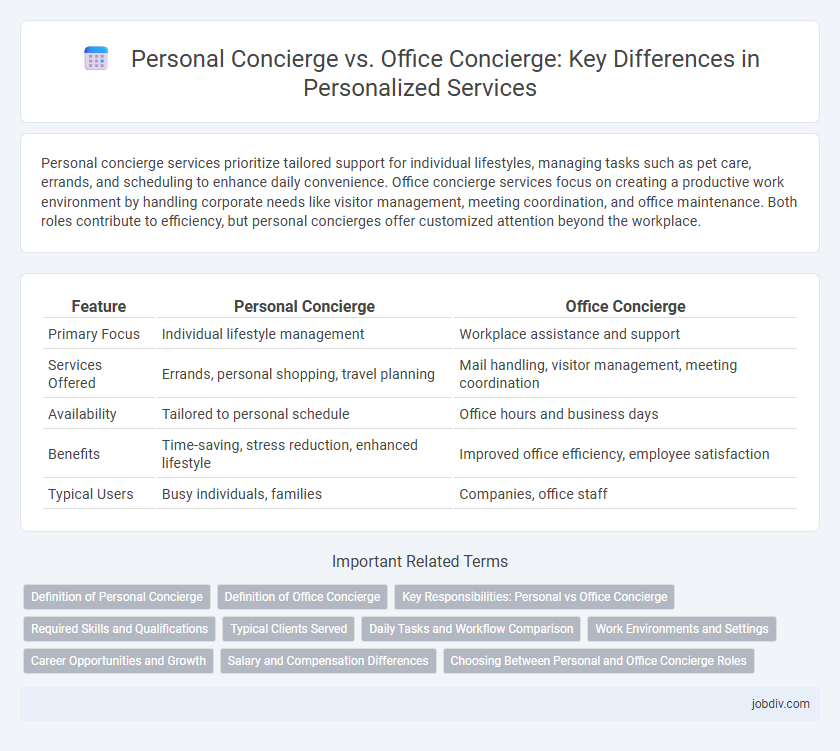Personal concierge services prioritize tailored support for individual lifestyles, managing tasks such as pet care, errands, and scheduling to enhance daily convenience. Office concierge services focus on creating a productive work environment by handling corporate needs like visitor management, meeting coordination, and office maintenance. Both roles contribute to efficiency, but personal concierges offer customized attention beyond the workplace.
Table of Comparison
| Feature | Personal Concierge | Office Concierge |
|---|---|---|
| Primary Focus | Individual lifestyle management | Workplace assistance and support |
| Services Offered | Errands, personal shopping, travel planning | Mail handling, visitor management, meeting coordination |
| Availability | Tailored to personal schedule | Office hours and business days |
| Benefits | Time-saving, stress reduction, enhanced lifestyle | Improved office efficiency, employee satisfaction |
| Typical Users | Busy individuals, families | Companies, office staff |
Definition of Personal Concierge
A Personal Concierge provides tailored services such as managing personal errands, scheduling appointments, and arranging travel for individuals or families, emphasizing convenience and time-saving. Unlike an Office Concierge who primarily handles workplace tasks like visitor management and administrative support, a Personal Concierge focuses on personalized lifestyle assistance. This role often includes tasks like grocery shopping, event planning, and household management to enhance clients' daily living experiences.
Definition of Office Concierge
Office Concierge services provide tailored support within corporate environments, managing tasks such as mail handling, visitor coordination, and administrative assistance to enhance workplace efficiency. These professionals facilitate smooth office operations by addressing employee needs and optimizing time management, distinct from Personal Concierge roles that focus on individual lifestyle management. By integrating technology and personalized service, Office Concierges contribute to improved productivity and employee satisfaction in business settings.
Key Responsibilities: Personal vs Office Concierge
Personal concierge services focus on managing individual clients' personal tasks such as scheduling appointments, booking travel, and handling private errands, ensuring personalized attention and convenience. Office concierges primarily support workplace needs, including coordinating office supplies, facilitating meetings, managing visitor access, and enhancing employee satisfaction. Both roles emphasize organization and communication skills but differ in client focus and daily task complexity.
Required Skills and Qualifications
Personal concierges require exceptional interpersonal skills, discretion, and the ability to anticipate clients' personal needs, often possessing expertise in lifestyle management and luxury services. Office concierges must demonstrate strong organizational skills, multitasking abilities, and knowledge of corporate environments to efficiently manage office logistics and employee support. Both roles benefit from excellent communication skills and a proactive approach, but personal concierges prioritize personalized service while office concierges focus on professional administrative assistance.
Typical Clients Served
Personal concierge services primarily cater to individuals seeking assistance with daily tasks, lifestyle management, and personal errands, often serving busy professionals, high-net-worth individuals, and families. Office concierge services typically focus on corporate environments, supporting employees and visitors by managing administrative tasks, event coordination, and facility-related needs. Both types of concierge services aim to enhance productivity and convenience but target distinctly different client bases based on personal versus professional requirements.
Daily Tasks and Workflow Comparison
Personal concierges specialize in managing individual clients' daily tasks such as scheduling appointments, running errands, and organizing personal events to streamline personal workflows. Office concierges primarily focus on supporting corporate environments by handling tasks like mail distribution, visitor assistance, and maintaining office supplies, enhancing workplace efficiency. The workflow of personal concierges is highly flexible and client-specific, whereas office concierges follow structured routines aligned with corporate schedules and protocols.
Work Environments and Settings
Personal concierge services cater to individual clients by managing errands and lifestyle needs outside of work, ensuring seamless day-to-day personal arrangements. Office concierge services operate within corporate work environments, enhancing employee productivity and satisfaction through tasks such as mail handling, event planning, and facility management. Both types streamline routines, but personal concierge prioritizes private life convenience while office concierge focuses on optimizing professional workspace functionality.
Career Opportunities and Growth
Personal concierge roles offer career opportunities centered on individualized client services, with growth pathways in luxury lifestyle management, specialized event planning, and private client relations. Office concierge positions provide career advancement in corporate environments, emphasizing skills in facility management, administrative support, and employee engagement programs. Both sectors demand strong interpersonal abilities but differ in specialization, with personal concierge careers typically evolving through high-profile client networks and office concierge roles advancing via corporate structure and operational expertise.
Salary and Compensation Differences
Personal concierges typically earn an annual salary ranging from $35,000 to $60,000, influenced heavily by their employer's profile and client demands, while office concierges often receive between $25,000 and $45,000, reflecting their more structured workplace environment. Compensation for personal concierges may also include tips, bonuses, and benefits tailored to high-net-worth individuals, whereas office concierges usually have standardized benefits packages and less variable pay. The salary gap reflects differences in job scope, with personal concierges managing more personalized services and office concierges focusing on general facility support.
Choosing Between Personal and Office Concierge Roles
Choosing between personal and office concierge roles depends on the scope of responsibilities and work environment preference, as personal concierges offer individualized support such as managing private appointments and errands, while office concierges focus on enhancing the workplace experience through administrative assistance and visitor coordination. Personal concierge positions often require strong multitasking skills tailored to one client's lifestyle, whereas office concierge roles emphasize organizational abilities that support multiple employees and office dynamics. Understanding these distinct demands and work settings helps professionals select roles aligned with their skills and career goals.
Personal Concierge vs Office Concierge Infographic

 jobdiv.com
jobdiv.com